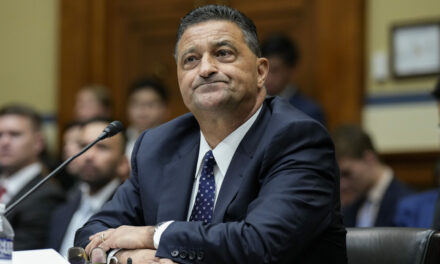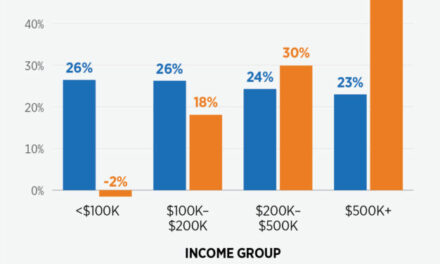We support our Publishers and Content Creators. You can view this story on their website by CLICKING HERE.
A Manhattan jury found former President Donald Trump guilty Thursday on 34 counts related to falsifying business records supposedly to cover up “hush money” payments to porn star Stormy Daniels. Now, Trump could face prison time.
Judge Juan Merchan will issue Trump’s sentence on July 11. So, what happens between now and the sentencing? And if Trump is given a prison sentence, can he still run for president and even be sworn into office? Hans von Spakovsky, Heritage Foundation senior legal fellow, joins “The Daily Signal Podcast” top news edition to explain.
Listen to the podcast or read the lightly edited transcript below:
Virginia Allen: The jury for former President Donald Trump’s criminal trial in Manhattan found Trump guilty on Thursday on all 34 counts. Trump is now a convicted felon. So, how did we get here and what happens next? Here with us to explain is Heritage Foundation senior legal fellow Hans von Spakovsky.
Hans, thanks for being with us.
Hans von Spakovsky: Sure, thanks for having me. Boy, how did we get here? You know, I mean, I hate to say this and make the comparison, but what was happening in New York reminded me kind of the Soviet show trials that were put on in Moscow in the 1930s.
If you look at the prosecutors, if you looked at the very biased judge who was constantly allowing the prosecution to do just about anything they want, including bringing in all kinds of irrelevant evidence, even down to the bizarre jury instructions he gave that violate several hundred years of our most basic legal principle, have to have a completely unanimous jury on all of the aspects of the charges brought, this was a bogus case from the very start, should never have been brought.
Just one other thing. Think about this. This trial took six weeks and the jury took less than two days to consider all of the evidence in this case. That indicates to me that they had decided a long time ago that regardless of the evidence they were going to convict Donald Trump, which, given the politics of this jury, the politics of Manhattan, is really no surprise.
Allen: Former President Donald Trump has repeatedly used the word “conflicted” as he has referred to the judge, Judge Juan Merchan, in this case. Why is the judge conflicted?
Von Spakovsky: Look, there are very strict ethics rules that apply to judges, and one of those rules is that you cannot be on a case in which you or a family member has a personal financial interest. Well, his daughter is a Democratic political consultant. In fact, she’s represented Democratic consultants, apparently even the Biden campaign. And some of her clients have been making money, raising money on this trial.
Not only that, but Juan Merchan, it came out just recently, he was issued a letter of caution by the New York judicial ethics commission. Why? Because he violated the strict prohibition on judges making political contributions. He was making political contributions to Democratic candidates, apparently including a PAC supporting Joe Biden.
He should have never been on the case from the very beginning, should have recused himself. The fact that he didn’t, I think, is a major point in any appeal that’s filed.
Allen: Hans, we’re all wondering what happens next. We’ve learned that the sentencing is supposed to be on July 11. What happens between now and July 11?
Von Spakovsky: Well, it’s maybe hard for people to believe, but the Probation Department in New York is supposed to do an investigation of the defendant, interviewing the defendant, looking at creating a bio of his background, and then making a sentencing recommendation to the judge. So, that’s going to happen before that hearing date, which, as you know, is just a couple days before the Republican Party convention.
Allen: So, a recommendation is made to the judge regarding the sentence and then, ultimately, the judge is the one that hands down that sentence?
Von Spakovsky: Yeah, the judge can entirely—apparently, in New York, the judge can entirely discount what the recommendation is and do anything he wants to and it could be everything from a fine, a suspended sentence to many, many years in jail.
Allen: What do you think is the most likely sentence that we’re going to see handed down from the judge?
Von Spakovsky: I Think that the political bias of this judge has shown that he is going to do whatever he thinks he can get away with and I think that means he’s going to try to restrict the president to staying in New York and perhaps will even give him prison time.
Allen: OK. And the maximum amount of prison time is four years he could receive?
Von Spakovsky: Well, it was 34 felonies. So, no. It’s many, many, many years in jail. If he sentences him to years in jail on each count, he could be in jail for the rest of his life, which is just totally and completely absurd and such an outrageous miscarriage of justice in this case.
Allen: Well, since that felony conviction around 5 p.m. on Thursday to mid-afternoon Friday, the Trump campaign announced that it had raised $34.8 million, a great deal of that in small donations from new donors. What do you think that tells us about the American people’s view of this case?
Von Spakovsky: I think it once again confirms to me something I’ve always thought, which is the American people are a lot smarter than the liberal media and Democratic leadership and other people like that think they are.
Look, a majority of Americans, even folks who don’t support Trump, I think, have recognized, and the polling shows, that this is really a political persecution. I’ve even heard some liberal commentators on some of the channels saying, “Look, we all know this case would not have been brought if the defendant was anyone other than Donald Trump.”
And to give you a perspective on this, remember, Hillary Clinton’s campaign was fined by the Federal Election Commission for not listing as a campaign-related expense their payment and hiring of and creation of the Steele dossier, right? The dossier that created the whole Russia-Trump hoax. They paid a civil penalty. It was like, I think, $113,000 total between Hillary Clinton’s campaign and the [Democratic National Committee]. And here we have a state, a local prosecutor trying to put him in jail for what he claims is a similar issue even though he’s actually wrong about that.
Allen: So, let’s say the judge does sentence former President Donald Trump to prison time, could Trump still be on the ballot for the November election? And could he even be elected president while sitting in a prison cell?
Von Spakovsky: That is absolutely, yes, that is the correct answer. It would be improper for any state to take him off the ballot. And the reason is the Constitution sets out three requirements to be president. You have to have been a resident of the country, I think for 14 years; you have to be a certain age; you have to be a natural born citizen—and that’s it. No state can put in any other qualification to be president.
And that means that the conviction could stay, he could be in prison. Not only could he get elected, he could get sworn in as president, and the only way he could be removed is if Congress impeaches him.
Allen: So, let’s say he is elected, he wins in November, sitting in a prison cell. What happens?
Von Spakovsky: Well, you would think that under those circumstances, the governor of New York would do the right thing, even though the governor is a Democrat and would issue a pardon so that the president can go serve. Like I said, this case should never have been brought to begin with. The prosecution failed to produce evidence that an actual crime had been committed, no matter what this jury says. And that, to me, would be the proper response of the governor of New York.

 Conservative
Conservative  Search
Search Trending
Trending Current News
Current News 





